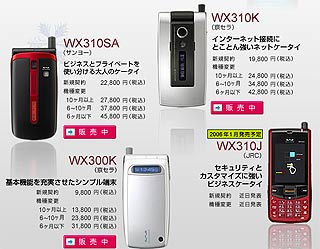 “Despite the high prices, there were huge line-ups waiting to buy the new Willcom PHSes,” said my Kiwi pal in an email last night. It looks like some of Willcom’s PHS phones appear to be selling well on the strength of flat-rate voice and data and handsets that are at least comparable to the high-end 3G cellular models from the Big Three carriers. Is this a hint of price destruction to come when the new licensees jump into the market in 2006?
“Despite the high prices, there were huge line-ups waiting to buy the new Willcom PHSes,” said my Kiwi pal in an email last night. It looks like some of Willcom’s PHS phones appear to be selling well on the strength of flat-rate voice and data and handsets that are at least comparable to the high-end 3G cellular models from the Big Three carriers. Is this a hint of price destruction to come when the new licensees jump into the market in 2006?
“It normally takes about 20 minutes to get a new phone, but the wait for the new Willcom models on the first day of sales was over an hour and a half. A day or two later and the long lines have vanished,” added Keith Wilkinson, a long-time Japan hand and a keen watcher of all things electronic.
He was referring to the WX300K, WX310K and WX310SA, from Kyocera and Sanyo, as initially reported by WWJ in October, the first in a new series of PHS models. PHS is the shorter-range, non-cellular standard that has enjoyed a resurgence in popularity due to lower costs of usage and flat-rate pricing. According to Willcom, phones could be reserved starting on 11 November, and became or will become available in shops on the 18th (WX300K, silver and ochre), the 25th (WX310K, silver & pink; WX310SA, silver & red) and the 30th (WX310K, other color).


 “Despite the high prices, there were huge line-ups waiting to buy the new Willcom PHSes,” said my Kiwi pal in an email last night. It looks like some of Willcom’s PHS phones appear to be selling well on the strength of flat-rate voice and data and handsets that are at least comparable to the high-end 3G cellular models from the Big Three carriers. Is this a hint of price destruction to come when the new licensees jump into the market in 2006?
“Despite the high prices, there were huge line-ups waiting to buy the new Willcom PHSes,” said my Kiwi pal in an email last night. It looks like some of Willcom’s PHS phones appear to be selling well on the strength of flat-rate voice and data and handsets that are at least comparable to the high-end 3G cellular models from the Big Three carriers. Is this a hint of price destruction to come when the new licensees jump into the market in 2006?